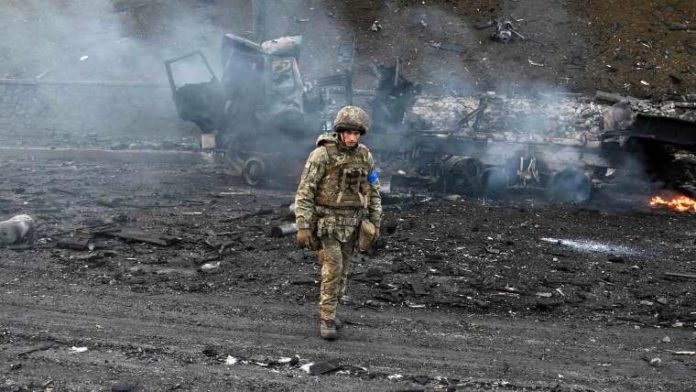By Biodun Olamosu
War, according to Carl von Clausewitz, is the continuation of policy by other means that is not conventional. His emphasis is on clashes of interest for political motives by the state institutions thereby leading to violence. This involves killings, maiming of people and destruction of properties, lack of safety and security and devastation of social and economic wellbeing. In such a situation, people are reduced to destitution while thousands and millions of refugees are compelled to leave their homes for other areas or other countries.
Carl von Clausewitz wrote this advice in 1832, as a participant observer, a General in the Prussian Army. This can still act as a guide for us today, but he could not have envisaged rise of non-state actors who are now also involved in acts of war. Such cases as Afghanistan, Mali, and Nigeria (with Boko Haram) can be cited as viable examples in this regard.
Wars that are meant to exploit and oppress other peoples, as against those carried out to defend themselves from their aggressors, or for the cause of self-determination, are best associated with capitalism and imperialism in the present dispensation. This is against the background that capitalists are compelled to look beyond their territories for markets, raw materials and labour power. Hence the need to extend their tentacles elsewhere, but this is not without struggle with their business competitors. Such economic competitions and rivalries in other lands are usually accompanied with violence, overtly or covertly and this can lead to war. This is the very reason wars were common in the period of the trans-Atlantic slave trade, colonization and post-colonial conquests.
Not a few wars have occured to promote the cause of imperialist powers. These include the First and Second World Wars in 1914-18 and 1939-45 respectively. In the more recent period, wars waged by the US against other countries include: Afghanistan, Iran, Iraq, Vietnam, Korea, Libya, Venezuela, Grenada, Ethiopia, etc.
The outcome of the Second World War, unlike the First World War that resulted in the 1917 Russian revolution, was the sharing of the conquered parts of the world (formerly under the control of Germany, Italy and Japan) amongst the emergent super powers. These include USA, France, Britain and Russia. The affected countries in Eastern Europe, Asia and Africa included Poland, Czechoslovakia, Albania, Yugoslavia, Bulgaria, Libya, Eritrea, Somalia and Cameroun. While countries in Africa were shared between Britain and France; Korea and Germany were divided amongst the new super powers. This was the very reason for the extant separation of North and South Korea. East and West Germany were shared between Russia and the West, but have since merged into one country.
Russia played a central role in the defense of its territory attacked by Hitler led German aggression. The other emergent super powers were late comers to the war. They were more concerned with how to defend their colonies in the Middle East, North Africa, Asia and Eastern Europe by locating their military forces there; rather than joining the war at the western flank where they were urgently needed. They were reluctant to participate at this level and signed a treaty with Hitler for detente as they felt that they were not directly affected.
This was why Russia was made to bear the major brunt of the war that resulted to the death of over 20 million Russians. In many other places, such as Italy, Greece and Yugoslavia, volunteers led by the working class and communists engaged the Nazis in their various communities and cities. For example, they achieved victory over the Italian state under Mussolini. German forces had to come in to provide a helping hand in rescuing the situation. Later partisans were victorious in Greece and Yugoslavia.
It was only in Yugoslavia that such forces from the working people climbed to power at the end of the war. In Greece, the British army took power from the partisan led government in line with the agreements made with Stalin, the Russian dictator, on spheres of influence at the Yalta and Potsdam conferences in 1945 .
In the West, especially in the US during the 1950s, communists were officially hunted down and lost their offices in the trade unions and teachers in colleges had to renounce communism to retain their chairs and jobs.
In the East, those that still professed genuine communism faced ideological collision with the official ideology coming from Kremlin, the Russian seat of power. Many were to suffer for their commitment and consistency to Marxist ideas by being imprisoned or even executed. No leaders of the 1917 Russian revolution remained in 1945, apart from Joseph Stalin (head of Soviet Union government) and Alexandra Kollontai (an ambassador to Sweden). Others were executed, apart from V. I. Lenin, who died from natural causes in 1924. Leon Trotsky, the former head of the Red Army, was exiled, eventually to Mexico where he was assassinated in 1940 on the orders of the same executioner, Stalin.
Russia was no more committed to the ideology inspired by Marxism due to its degeneration after Lenin. In practice, it was categorized as a state capitalist country, associated with state ownership of industries, and central planning of the economy without workers control. This did enable massive economic growth indicated by Russia testing its first nuclear weapon in 1949, launching the first ever satellite in 1957 and the first person in space in 1961.
Nevertheless, Russia was subject to the rules of market forces in its interaction in the world market. It faced intense military competition with the US and consistently spent proportionally more on its military than the US. This was because, the Russian economy, despite massive growth was still only half the size of the US economy by the 1970s.
The entire edifice of the Russian USSR collapsed in 1989 and by 1991 many independent countries had emerged. They also faced political revolutions in their respective countries and different forms of neoliberalism with deregulation and privatization. So rather than what Leon Trotsky envisaged of a revolution from below to address the imbalance against the extant bureaucratic deformation of the Russian revolution, what took place was the restoration of capitalism and a particular form of corrupt free market neoliberalism.
The experience of Russia in the post Stalinist era after her hegemony in the East has been one of mixed feelings by the oligarchy that composed the ruling class in the country. The working people faced increased insecurity and unemployment; welfare programmes that attracted many people to their system became a thing of the past. Such economic indices best associated with less developed countries found their way to Russia.
The few oligarchs (corrupt elite) made their wealth from the sales of state properties and companies in a process that amounted to looting of the economy. They were the only beneficiaries of the return of capitalism. Putin represents a faction of the oligarchy, as well as the old bureaucracy in opposition to the former president, Yeltsin. Putin is not comfortable with the fragmentation of the former USSR and wants a return to the former Tzarist empire of the 19th century. Like the former US president, he wants to make Russia great again.
NATO and the Western leaders gave assurances that NATO would not be extended to Eastern Europe with the dissolution of the Warsaw Pact and the fall of the Berlin Wall in the 1990s.
This agreement has been unfortunately jettisoned by the US and NATO with the lame excuse that the agreement was made with old USSR and not Russia. NATO has not stopped expanding since the fall of the Soviet Union, growing from 17 countries in 1990 to 30 today, several of which were once part of the Soviet-led Warsaw Pact.
This is the background the present contestation between the US, NATO, Ukraine and Russia. Ukraine only represents a proxy war landscape as the major grievance is between the US and Russia (on another level it part of the competition between the US and China with a warning for the later not to invade Taiwan). One difference is that the US has invaded many countries on the other side of the war, but Ukraine borders Russia and they were once part of one country. Russia demands that the proposal for Ukraine to join NATO should be rescinded. They claim that this constitutes a security risk and a threat against Russia’s corporate existence.
Many people’s attitude to the invasion of Ukraine depends on their attitude to these developments. The invasion is meant to pre-empt and checkmate the West to reconsider their position on this and what is likely to be its consequences. This was against the background of the manipulation of the Ukraine over the last eighteen years. This included helping to remove the former president, Yanukovych, for his opposition to joining NATO.
Joining NATO was linked to joining the European Union that expected Ukraine to carry out anti-poor policy of austerity measures and to devalue her currency. These measures further repelled Yanukovych, the former Ukrainian president, from taking such an option, he therefore looked to Russia to provide grants and loans to facilitate economic development. This infuriated the US. Genuine protests against corruption in the Ukraine were utilised by the right-wing elements with support from the US. Yanukovych was forced out of power in February 2014 due to the terror unleashed on the movement. An independent report claimed this was not by the government but the neo-Nazis faction of the movement itself.
The supporters of Yanukovych, with a major base in the Russian speaking Eastern part of Ukraine, intensified their agitation for independence from Ukraine. The repression by the Zelensky led government was backed by the US and NATO Not less than 130,000 deaths have been recorded from this repression. The government also changed the national language of the county from Russia. This prompted the Russian government to recognize the separatist groups.
On the second day of the Russian attack various forms of sanctions were imposed without calling the warring factions to the negotiation table. The sanctions included placing an embargo on the purchase of oil and gas from Russia that is the major exporter of oil and gas to Europe. The US only imported less than five percent its oil from Russia before the war.
The US reached out to some oil producing countries such as Iran, Venezuela and Saudi Arabia for the supply of emergency oil and gas for herself and her allies. How effective this may be is yet to be seen as even Saudi Arabia, previously a close ally of the US, rejected such offer.
The US also confiscated Russian foreign exchange and gold reserves held in American banks. This may work against the best interest of the US in the longer term. More countries, including her allies may no longer see US banks as safe places to keep their treasures and foreign reserves.
This may also herald the end of the dollar as a world currency. China, Russia, Brazil, India and South Africa may adopt a common means for their foreign exchange transactions. Russia has announced a step in this direction by calling consumers of her oil and gas and other products to pay with the Russian currency – the rouble.
We should learn from history. The ambition of the US to dominate the entire world may be compared with the same ambition of Germany under Hitler. This led to the Second World War.
US hegemony is asserted in other areas including security, industry, commerce, etc. The US sees herself as the police force of the world. The Wolforwitz strategy (1992) is meant to ensure that: “no nation on earth attains enough power, either economic or military, to challenge US hegemony … and remain the only super power”. So this policy is not meant to refer to Russia only. It also refers to China and other major powers that may presently be her allies.
The events of today is teaching these countries a lesson that they have to rearm rather than to continue to rely on US forces. Germany, Japan, and the Scandinavian countries are moving in this direction. The US has had their military forces based in Germany, Japan, and South Korea since the Second World War. The host countries are paying billions of dollars ($b) annually. This also reflects a return to the cold war era with militarization and competition across the world.
History shows that all imperial powers rise and fall. Before the first world war the major powers were Britain, France and German. After the second world war it was the US and Russia. The Russian revolution of 1917 inspired the working class internationally (including oppressed nations), but the counter revolutionary forces that gained power in Russia (in the late 1920s) worked against this and set aback the gains of the revolution.
By the time the Second World War surfaced the genuine working class forces were nowhere to be found in quantum to harvest the gains of the earlier 1917 Russia revolution, instead Russia bureaucracy sat on the progress of the working class movement and prevented it to grow to its expected level despite its pretension and her being misnamed “communist state”.
Suffice to say that the labour movement with socialist ideology has the historical responsibility to chart a new way forward as alternative to capitalism and imperialism. There is no space for us to support either USA-NATO on the one hand and or Russia (including China) on the other hand. They all represent enemies of the working class.
This is the very reason that there is the need to organize against the capitalist exploiters and oppressors in our own countries. This is the only way to fight against imperial wars that have marked the history of capitalism. It is therefore imperative to say no to Russian aggression in the Ukraine (so also in other places) and also no to USA-NATO expansionism. NATO as presently constituted should be disbanded as it represents a security risk to humankind rather than it being capable of offering security and protection.






